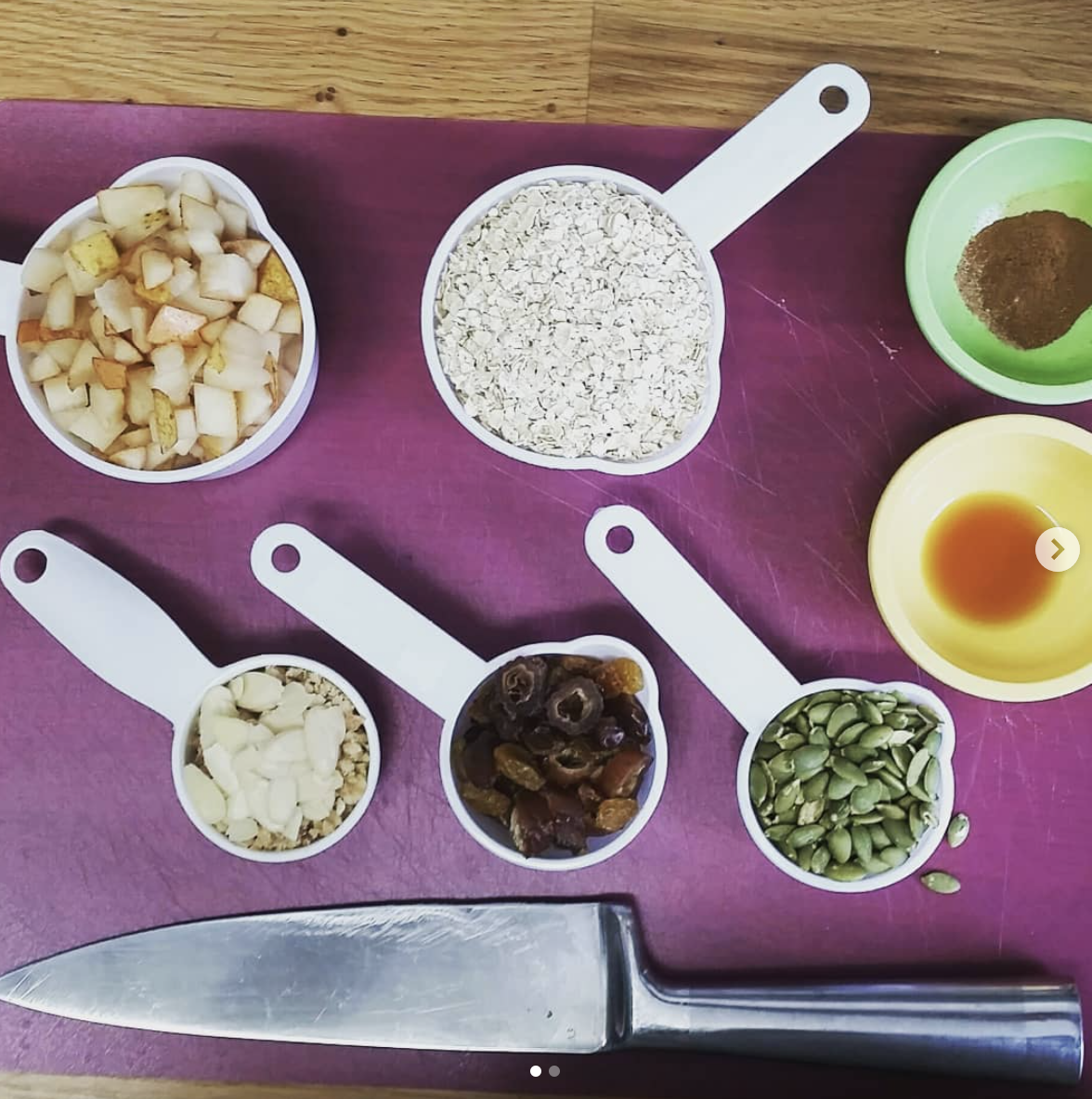Find practical tips on what to eat for better sleep and how gut health plays a crucial role in our overall wellness.
Guest post by Carley Higgins and Lori Marshall
Do you find yourself sleepy on a daily basis, reaching for caffeine to keep your eyes from shutting at work, or longing for that midday nap? If so, you are not alone. Fifty-five percent of Americans say they feel sleepy because they are not sleeping well, and 1/3 of Americans suffer from sleep deprivation. Not only does lack of sleep make us tired, it impacts our daily activities, mood, mental acuity and how and what we eat. On top of short-term effects, long-term effects of lack of sleep can lead to cardiovascular problems, higher risk of obesity and type 2A diabetes and anxiety. Improving your sleep hygiene, your environment and habits before bed and throughout the day, can positively affect your sleep quality and quantity. As Sleep Awareness Week is upon us, there are many tips to improve sleep hygiene, but nutrition and gut health are two interesting areas to explore that you may have never connected to your tiredness troubles.
The gut microbiome
The gut microbiome is made up of microorganisms and bacteria inside of your gut that are crucial for your health, digestion, the immune system and bodily processes. Having a higher microbiome diversity is considered good for your health, and your sleep. Diversity of gut microbiome is associated with increases in sleep efficiency and sleep time, while negative diversity is correlated with waking after sleep onset. In order to keep your gut health in check, focus on eating a wide range of foods. Restrictive diets (including vegan, vegetarian, and gluten free which omit certain foods/food groups), as well as the western diet (which tends to be high in animal protein and fat and low in fiber) can lower gut microbiota due to the lack of food variety.

The food connection
It would be simple if one diet solved all our sleep issues, but that is not the case. Rather, a balanced diet, filled with fruit and vegetables, high fiber and low saturated fats are shown to improve sleep. There are also some foods that can help us get a better night’s sleep including tart cherries, malted milk, fish and nuts. Diets high in complex carbs and foods with tryptophan, melatonin and phytochemicals are also associated with better sleep. Diets associated with poorer sleep are those high in fat, low in zinc and those deficient in omega 3 fatty acids and Vitamin D.
Caffeine, soda and alcohol can also have a negative impact on your sleep. Caffeine is a stimulant; it can increase your alertness. And although moderate intake (250 milligrams a day) is safe, if you are using it to make up for lack of sleep, or drinking it late in the day to cause potential insomnia, it could be time to cut back. Soda is another beverage that can have a negative effect on sleep. Many are filled with sugar and have caffeine, and they can increase the likelihood of heartburn and nocturia, the need to urinate in the middle of the night. These symptoms lead to decreased sleep duration in adults and children. Alcohol, although it has sedative effects, causing relaxation and sleepiness, is linked to poor sleep quality. Falling into a deep sleep after consuming alcohol leads to an imbalance of slow wave sleep and REM sleep, resulting in more slow wave and less REM sleep. Even small amounts of alcohol before bed can decrease sleep quality by 9.3% while moderate consumption decreases sleep quality by 24%.
It’s clear what we eat and drink can affect our sleep, but sleep also affects our nutrition and food choices. Insufficient sleep is linked to elevated risk of obesity and greater waist circumference. Studies show people who do not get enough sleep are more likely to increase their food intake particularly higher-calorie foods and are less likely to increase their energy expenditure. Hormones in our body are responsible for this desire to eat more. Leptin and ghrelin are two hormones that control appetite and hunger, and inadequate sleep throws off their production. As leptin levels fall, appetite increases. If you are feeling extra hungry for high calorie snacks and foods, take a look at your sleep habits to see if they could be the reason.
How to have a good night’s sleep
Improving your sleep, and therefore your overall health can seem like a daunting task. Here are a few tips some nutrition-related, others not to get you started. Changing habits does not start overnight (pun intended), so choose one or two of these tips to incorporate into your routine this week.
- Monitor/limit your caffeine and alcohol intake especially close to bedtime.
- Do not eat too late at night, as it’s harder to sleep when your body is digesting.
- Incorporate foods high in melatonin into your diet, like tart cherries, milk, fish with omega 3 fatty acids, and nuts, like pistachios and almonds.
- Add more fruits and vegetables into your diet throughout the day.
- Get some sunshine! Our body’s natural clock relies on the sun.
- Switch up the foods you eat every now and then to keep your gut microbiome diverse
- Commit to getting moderate exercise a few days a week.
Try out the below recipes which have been known to have sleep-supportive qualities to lull you off to la-la land:
Moon Milk
Gently heat together the following for a relaxing, sleepy-time treat before bed:
- 1 c milk (almond milk has more sleep-inducing chemicals)
- 1/2 c tart cherry juice
- 1 tsp honey
- splash of vanilla extract (or scraped-out seeds from one vanilla bean)
- pinch of nutmeg
Everything But The Kitchen Sink Oatmeal

Ingredients:
- 1-2/3 cups water
- 1 cup quick cook oats
- Dry seasonings of your choice (I used 1 tsp cinnamon, pinch each of nutmeg and cardamom)
- 1 medium fresh fruit of your choice, chopped (I used a pear which yielded about 1.25 cups)
- 1/4 cup crushed nuts (I used walnuts and almonds)
- 1/4 cup dried fruit (I used chopped dates and golden raisins)
- 1/4 cup raw seeds (I used pepitas)
- 1 tsp vanilla extract
Instructions:
- Bring water to a boil in a pot. You can use a little more water for thinner oatmeal or a little less for thicker oatmeal.
- Add oats and dry seasonings. Reduce heat to medium and stir. Cook for 30 seconds. Then add everything else except vanilla. Cook for another minute, stirring constantly.
- Remove from heat. Add vanilla and stir.
Serve with your favorite milk. - Optional: If you have a sweet tooth, adding no more than 1/2 teaspoon of honey or maple syrup intensifies the sweetness of the fruit.
Makes three 1-1/2 cup servings.
Share this post with a friend!
References:
- How Sleep Works – SleepFoundation.org
- Smith RP, Easson C, Lyle SM, Kapoor R, Donnelly CP, Davidson EJ, et al. (2019) Gut microbiome diversity is associated with sleep physiology in humans. PLoS ONE 14(10): e0222394. https://doi.org/10.1371/journal.pone.0222394
Carley Higgins (T) is a student volunteer and Lori Marshall, BS, NDTR (B) is a Dietetic Intern with DishWithDina.





0 Comments